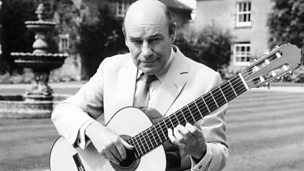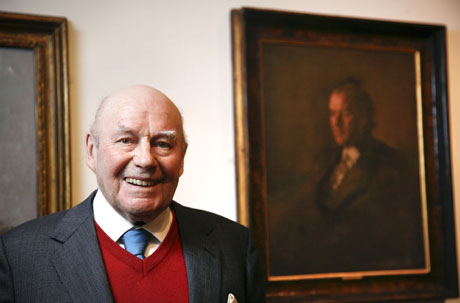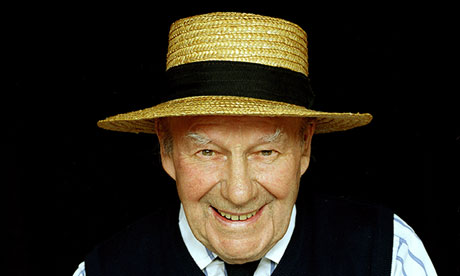Julian Bream: New Interview on BBC – Dec 23, 2013

In the first of a series of Christmas specials, Sean Rafferty visits guitarist Julian Bream at home in Wiltshire to discuss a lifetime of music making.
At 80 years old, Julian Bream CBE has left a lasting legacy on the world of classical music, he popularised the lute and Elizabethan music and worked closely with composers such as Benjamin Britten, Michael Tippett and Malcolm Arnold to increase the guitar’s repertoire.
Julian talks candidly to Sean about his experiences as a child prodigy, forced to play the piano and cello because the guitar wasn’t considered a “serious” classical instrument and recounts his first experience, as a teenager, sitting in the Wigmore Hall with a pair of binoculars watching the hands of his hero Andres Segovia. Bream describes the anguish he felt while he locked himself in a shepherd’s hut in majorca for 10 days forcing himself to master Britten’s fiendishly difficult Nocturnal and how he offered Malcolm Arnold £30 to write him a concerto – a commission which was fulfilled in a matter of days.
Now at the end of his career and playing no more than a few notes on his guitar, this extended interview is a unique insight into one of Britain’s most important musical figures of the 20th Century.
Julian Bream Interview, September 2013
This time with The Guardian.
“There’s nothing sad about not playing any more. The thing I feel a little annoyed about is that I know I’m a better musician than I was at 70, but I can’t prove it.”
“I became much more critical in the last decade, of phrasing and tempo and general musical interpretation.”
“I devoted my life to music for a reason, and the reason wasn’t because I wanted to get on or make money, but to try to fulfil myself and also to give people pleasure. That’s been my credo.”
“The last 10 years of my life, from 70 to 80, have been the most interesting because I have only done what I wanted to do. I have cut away what I call the excess stuff in my life. I’m quite reflective – I listen to music, I read, I walk with Django.”
“I’ve had a lovely life. I’ve had a great life. Letting go, yes, but in a controlled way. Now it’s time to let go, to enjoy what’s left.”
Julian Bream Turns 80 – BBC Interview
Julian Bream turned 80 today. He was interviewed by the BBC a few days ago.

From the BBC:
Tom Mckinney meets guitarist Julian Bream on the eve of his 80th birthday to discuss his career and a defining composition by Benjamin Britten that helped to elevate him and his instrument onto the global stage.
Julian Bream is arguably the most important guitarist of the second half of the twentieth century: pioneer of the burgeoning period instrument movement and champion of new repertoire for the guitar. The archetypal eccentric Englishman with a huge personality and incredible musical ability, Bream had a massive impact on the global musical scene from the 1960s, becoming a genuine a household name with appearances on prime-time television and platinum record sales.
His performances at the Aldeburgh Festival in the 50s, especially his recitals of Elizabethan songs with Benjamin Britten’s partner the tenor Peter Pears, eventually led to Britten writing what is perhaps the guitar’s finest work – the Nocturnal after John Dowland, an unsettling and often disturbing set of variations based on the song Come Heavy Sleep by John Dowland. It was a landmark moment: that a composer of Britten’s stature should write such a substantial and significant piece of music for the guitar, changed at once the perception of the instrument and its subsequent repertoire. At that time the guitar was still a minority instrument, inseparably linked to its Spanish heritage. Bream pounced on the opportunity to play Nocturnal worldwide, almost utilising it as a bargaining chip to coax many other major composers into write for guitar, such as Walton, Tippett, Henze, Takemitsu and Maxwell Davies.
With contributions from guitarist Craig Ogden, Britten expert Mervyn Cooke and Bream biographer Tony Palmer, we will hear about the legacy of the Nocturnal and of Julian Bream’s remarkable contribution to the guitar’s history.
Fernando Sor: Fantasie, Op. 54 – Bream & Williams
A great look at the two giants, Julian Bream and John Williams, having a very fine time playing in one of Bream’s favorite spots, Wardour Chapel in Wiltshire, England, in 1979.
If you’ve been around the classical guitar world very long, you’ve heard lots of generalizations about these two. Popular opinion has it that Bream is the creative genius, while Williams is the supreme technician. Bream the Dionysian, Williams the Apollonian.
In this video we can see why people say such things. The contrast between them is striking.
But to stop there, with the easy observation, is to miss the best part of their gift to us.
What’s wonderful is the way their differences bring out the best in both. A beautiful and unexpected chemistry occurs.
As Williams himself said of the duo, “Although the way we each play is alike as chalk and cheese, we’re not two musicians, we’re an ensemble and we create magic together.”
Julian Bream’s Personal Art Collection

From the Royal Welsh College of Music & Drama:
Julian Bream, the world revered classical guitarist, has donated his personal art collection to the Royal Welsh College of Music and Drama. This extraordinary glimpse into the private thoughts and life of such a celebrated musician can be viewed at the Weston Gallery at RWCMD.
The collection comprises works personal to the musician such as a portrait of Bream by Derek Hill and one of his favourite dog, Casper by Jill Tweed. A number of paintings are by some of the most prolific Scottish artists of the 19th and 20th Centuries such as William McTaggart and David Gauld. Other featured artists include Sydney Nolan, Walter Richard Sickert, Elizabeth Frink and Bream’s own brother, Anthony Bream. The paintings are predominantly landscapes from the beginning of the impressionistic period, and portray a serenity typical of this style.
The Exhibition Launch on 6th March 2009 was well attended by friends and supporters. Hilary Boulding, Principal of RWCMD, welcomed the guests, “It has completely transformed one of our many recital rooms… It is wonderful, an extraordinary and generous gift.” Her words echoed everyone’s thoughts, particularly those who had admired the great guitarist for years. “Julian Bream is perhaps the most celebrated guitarist alive. He is a living legend… It is a superb gesture. We are truly honoured.” said John Mills, Head of Guitar Studies at RWCMD. Julian Bream seemed very happy and addressed the audience, “They do look pretty good if you don’t mind me saying… They are good friends, these paintings. I’m glad they’re here and I’m terribly moved.”
You can read the rest here.
Julian Bream and Stephane Grappelli play Django’s Nuages!
Isn’t this wonderful! Bream’s description of this performance is one of the highlights in A Life on the Road (written by Tony Palmer). I never thought I’d see it. And Bream’s performance is far better than we were given to believe. Just listen to the quality of Bream’s intro. What a treat!
